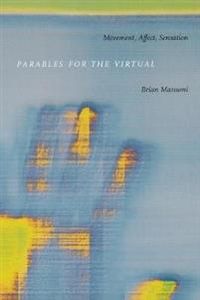
spara 44%
1 säljare
Parables for the Virtual
Although the body has been the focus of much contemporary cultural theory, the models that are typically applied neglect the most salient characteristics of embodied existence-movement, affect, and sensation-in favor of concepts derived from linguistic theory. In "Parables for the Virtual" Brian Massumi views the body and media such as television, film, and the Internet, as cultural formations that operate on multiple registers of sensation beyond the reach of the reading techniques founded on the standard rhetorical and semiotic models. Renewing and assessing William James' radical empiricism and Henri Bergson's philosophy of perception through the filter of the post-war French philosophy of Deleuze, Guattari, and Foucault, Massumi links a cultural logic of variation to questions of movement, affect, and sensation. If such concepts are as fundamental as signs and significations, he argues, then a new set of theoretical issues appear, and with them potential new paths for the wedding of scientific and cultural theory.Replacing the traditional opposition of literal and figural with new distinctions between stasis and motion and between actual and virtual, "Parables for the Virtual" tackles related theoretical issues by applying them to cultural mediums as diverse as architecture, body art, the digital art of Stelarc, and Ronald Reagan's acting career. The result is an intriguing combination of cultural theory, science, and philosophy that asserts itself in a crystalline and multi-faceted argument. "Parables for the Virtual" will interest students and scholars of continental and Anglo-American philosophy, cultural studies, cognitive science, electronic art, digital culture, and chaos theory, as well as those concerned with the 'science wars' and the relation between the humanities and the sciences in general.
Utgiven: 2002
ISBN: 9780822328971
Förlag: Duke University Press
Format: Häftad
Språk: Engelska
Sidor: 336 st
Although the body has been the focus of much contemporary cultural theory, the models that are typically applied neglect the most salient characteristics of embodied existence-movement, affect, and sensation-in favor of concepts derived from linguistic theory. In "Parables for the Virtual" Brian Massumi views the body and media such as television, film, and the Internet, as cultural formations that operate on multiple registers of sensation beyond the reach of the reading techniques founded on the standard rhetorical and semiotic models. Renewing and assessing William James' radical empiricism and Henri Bergson's philosophy of perception through the filter of the post-war French philosophy of Deleuze, Guattari, and Foucault, Massumi links a cultural logic of variation to questions of movement, affect, and sensation. If such concepts are as fundamental as signs and significations, he argues, then a new set of theoretical issues appear, and with them potential new paths for the wedding of scientific and cultural theory.Replacing the traditional opposition of literal and figural with new distinctions between stasis and motion and between actual and virtual, "Parables for the Virtual" tackles related theoretical issues by applying them to cultural mediums as diverse as architecture, body art, the digital art of Stelarc, and Ronald Reagan's acting career. The result is an intriguing combination of cultural theory, science, and philosophy that asserts itself in a crystalline and multi-faceted argument. "Parables for the Virtual" will interest students and scholars of continental and Anglo-American philosophy, cultural studies, cognitive science, electronic art, digital culture, and chaos theory, as well as those concerned with the 'science wars' and the relation between the humanities and the sciences in general.
Begagnad bok
189 kr332 krSpara 143 kr (44%) mot nypris
Fri frakt & skickas inom 1-3 vardagar
Köpskydd med Studentapan
Varje köp täcks av Studentapans köpskydd som säkerställer att boken kommer fram, att du får rätt bok och att skicket stämmer överens med beskrivning.



